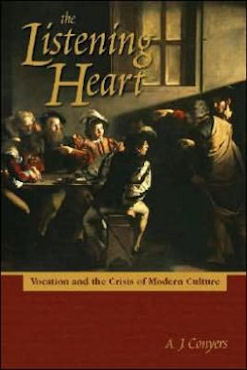
|
Posted October 31, 2013
Book: The Listening Heart: Vocation and the Crisis of Modern Culture Author: A. J. Conyers Baylor University Press. Waco, TX. 2009. Pp. 217 An Excerpt from the Jacket:
Revered theologian A.J. Conyers' last book, The Listening Heart, shows how a culture built upon the ideology of individual choice is a culture of alienation, loneliness, and violence. While Western culture was once informed by a sense of vocation, and men and women understood life as a response to a call from outside and above themselves, Conyers reveals with stunning insight how the quintessential institution of modernity is slavery --- rendering the ultimate autonomous individual alienated from family, church, and clan. Cogently arguing for the affections that constitute real community, Conyers restores a sense of vocation and thus addresses what it means to be human. An Excerpt from the Book: A hundred and some mills of central Carolina steadily produce well-designed furniture, but operating on a very different principle and from fundamentally different motives. They are in fact modern motives. They are modern in that they are more abstract: the successful business is known by its "bottom line" --- in other words, by an abstractly articulated monetary value, a value that is tenuously related to the value of the product as furniture or as art. For the modern world, a thing becomes of value in a way that is rationally divorced from the thing itself, while in the traditional society the value is worked into the object and becomes identified with the object itself. Similarly, the beauty of a product is (for the modern) in the design rather than in the thing itself. The end toward which the modern craftsman works, therefore, is removed from the thing itself. He makes furniture, but for the sake of making money. The means by which one works becomes more important than the end product, whether the intention is to produce a piece of furniture, or an automobile, or to cure a patient, or to render justice in the courts. The design, an abstraction of the thing itself, is the object of attention. Thus we attend to the abstraction of money, of means, of power --- of all manner of things that bear some relationship to what is the apparent object of our work, but not the object itself. We are distracted. To be modern is to exist increasingly in a state of distraction. Our attention is drawn away from those things that have been placed in our care, away from the center of our apparent concern to something abstractly related to that concern, and thus away from God himself who is the center of all things. To be modern is not only to find ourselves thus distracted, but to justify that life of distraction. In this sense, the problem of modernity is not so much an intellectual problem, and not basically an intellectual problem; it is rather a moral problem and a problem of the affections. We have failed to love properly what we ought to love and we fall away from that love which draws us toward God. Instead, we fasten upon that which draws us away from God. Table of Contents: 1. The era of bloodshed 2. Vocation and community 3. The broken image 4. The decline of vocation 5. Distraction 6. Power 7. Life together 8. Attention 9. Tolerance 10. Place 11. Rest 12. The return to community |
|
